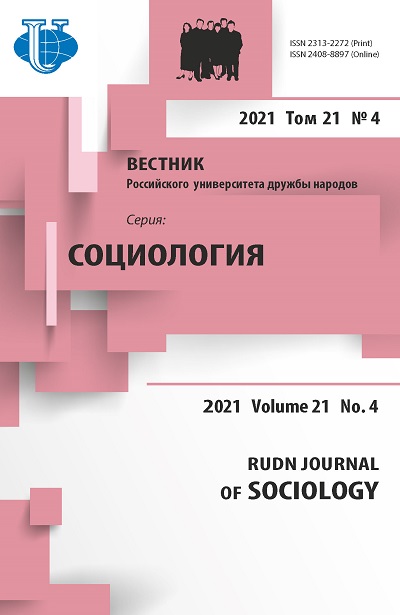The state and dynamics of the Russian mass consciousness and behavioral practices under the covid-19 pandemic
- Authors: Gorshkov M.K.1, Tyurina I.O.1
-
Affiliations:
- Federal Center of Theoretical and Applied Sociology of RAS
- Issue: Vol 21, No 4 (2021)
- Pages: 739-754
- Section: Contemporary society: the urgent issues and prospects for development
- URL: https://journals.rudn.ru/sociology/article/view/29616
- DOI: https://doi.org/10.22363/2313-2272-2021-21-4-739-754
Cite item
Full Text
Abstract
The expansion of the covid-19 has created a new pandemic social reality. In fact, for the first time in modern history, mankind faces a global crisis determined not by geopolitical or economic challenges but by a disease which spreads in most countries and all continents as a pandemic, which affects the current social-economic processes and development forecasts, reveals and intensifies the most acute social problems, and significantly transformed the functioning of the contemporary society. The pandemic was a complete surprise for the world and national communities - a surprise not so much medical or epidemiological as social. Already at the beginning of the pandemic, there was an opposition of two approaches to its probable social consequences. Some experts believed that it would change the society radically and irreversibly, would transform social institutions and change everyday life, and “the world will never be the same”. Others argued that the new social practices would not affect the deepest foundations of the established social order which would be later restored in its pre-coronavirus form [10]. However, it is obvious that the global and extraordinary social upheavals caused by the pandemic would have large-scale social consequences that need to be described and analyzed, in particular the impact of the coronavirus on the most important spheres and aspects of life as assessed by the people. The article is based on the results of the all-Russian sociological study and presents a comprehensive analysis of the Russian life under the pandemic. The authors provide data on the dynamics of material and social situation of Russians, explain the impact of the pandemic on the social-psychological well-being, public mentality and spiritual atmosphere. The authors pay particular attention to the behavioral practices of different groups of the Russian population according to their adaptation to new social-economic conditions, preservation and development of human potential, and view of the country’s future.
About the authors
M. K. Gorshkov
Federal Center of Theoretical and Applied Sociology of RAS
Author for correspondence.
Email: m_gorshkov@isras.ru
доктор философских наук, академик РАН, директор Института социологии, научный руководитель
Krzhizhanovskogo St., 24/35-5, Moscow, 117218, RussiaI. O. Tyurina
Federal Center of Theoretical and Applied Sociology of RAS
Email: irina1-tiourina@yandex.ru
кандидат социологических наук, ведущий научный сотрудник Института социологии
Krzhizhanovskogo St., 24/35-5, Moscow, 117218, RussiaReferences
- Abramov A.V., Bagdasaryan V.E., Byshok S.O., et al. Pandemiya covid-19: konets privychnogo mira? [Covid-19 pandemic: The end of the familiar world?]. Vestnik Moskovskogo Gosudarstvennogo Oblastnogo Universiteta. 2020; 2. (In Russ.).
- Volkov Yu.G., Kurbatov V.I. Globalnaya sotsiologiya pandemii: otechestvennye i zarubezhnye stsenarii i trendy poslekoronavirusnogo mira [Global sociology of pandemic: Russian and foreign scenarios and trends of the post-coronavirus world]. Gumanitary Yuga Rossii. 2020; 9 (2). (In Russ.).
- Vyzovy pandemii covid-19: psikhicheskoe zdorovie, distantsionnoe obrazovanie, internet-bezopasnost [Challenges of the covid-19 Pandemic: Mental Health, Distance Education, Internet Safety]. Vol. 1. Moscow; 2020. (In Russ.).
- Gafiatulina N.Kh., Kasyanov V.V., Samygin P.S., Samygin S.I. Rossijskoe obshhestvo v usloviyakh samoizolyatsii. Sotsialnye effekty i posledstviya pandemii covid-19 [Russian Society in Self-Isolation. Social Effects and Consequences of the Covid-19 Pandemic]. Moscow; 2020. (In Russ.).
- Gorshkov M.K. K voprosu o sotsiologii massovidnyh duhovnyh obrazovanij (teoretiko-metodologichesky aspekt) [On sociology of collective spiritual phenomena (theoretical-methodological aspect)]. Sotsiologicheskie Issledovaniya. 2021; 2. (In Russ.).
- Grishin V.I., Domashchenko D.V., Konstantinova L.V., et al. Zhizn posle pandemii: ekonomicheskie i sotsialnye posledstviya [Life after the pandemic: Economic and social consequences]. Vestnik REU im. G.V. Plexanova. 2020; 17 (3). (In Russ.).
- Obshchestvo i pandemiya: opyt i uroki borby s covid-19 v Rossii [Society and Pandemic: Experience and Lessons Learned in the Fight against the covid-19 Pandemic in Russia]. Moscow; 2020. (In Russ.).
- Pandemiya covid-19: Vyzovy, posledstviya, protivodejstvie [Сovid-19 Pandemic: Challenges, Consequences, Counteraction]. Moscow; 2021. (In Russ.).
- Rossijskoe obshchestvo v usloviyah pandemii: god spustya (opyt sotsiologicheskoj diagnostiki) [Russian society under the pandemic: One year later (an example of sociological diagnostics). Informatsionno-Analitichesky Byulleten (INAB). 2021; 2. (In Russ.).
- Sotsiologiya pandemii. Proekt koronaFOM [Sociology of Pandemic. Project CoronaFOM]. Moscow; 2021. (In Russ.).
- Toshchenko Zh.T. Obshchestvo travmy: mezhdu evolyutsiey i revolutsiei (opyt teoreticheskogo i empiricheskogo analiza) [Society of Trauma: Between Evolution and Revolution (A Theoretical-Empirical Analysis)]. Moscow; 2020. (In Russ.).
- Yarovova T.V., Sidyakov D.Yu. Sotsialnye posledstviya pandemii novoj koronavirusnoj infektsii v kontekste kachestvennogo razvitiya sovremennogo rossijskogo obshhestva [Social effects of the new coronavirus pandemic for the development of the contemporary Russian society]. ESU. 2020; 7. (In Russ.).
Supplementary files
There are no supplementary files to display.














